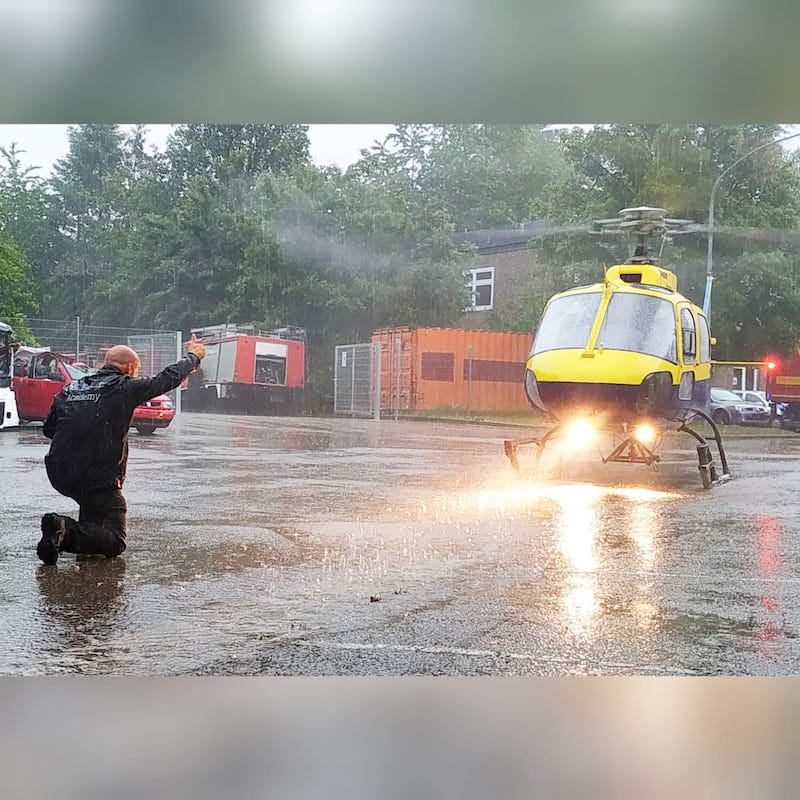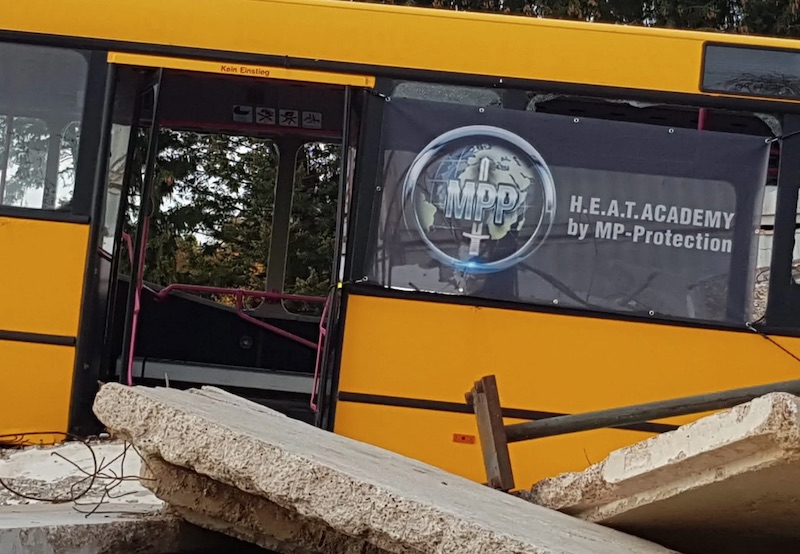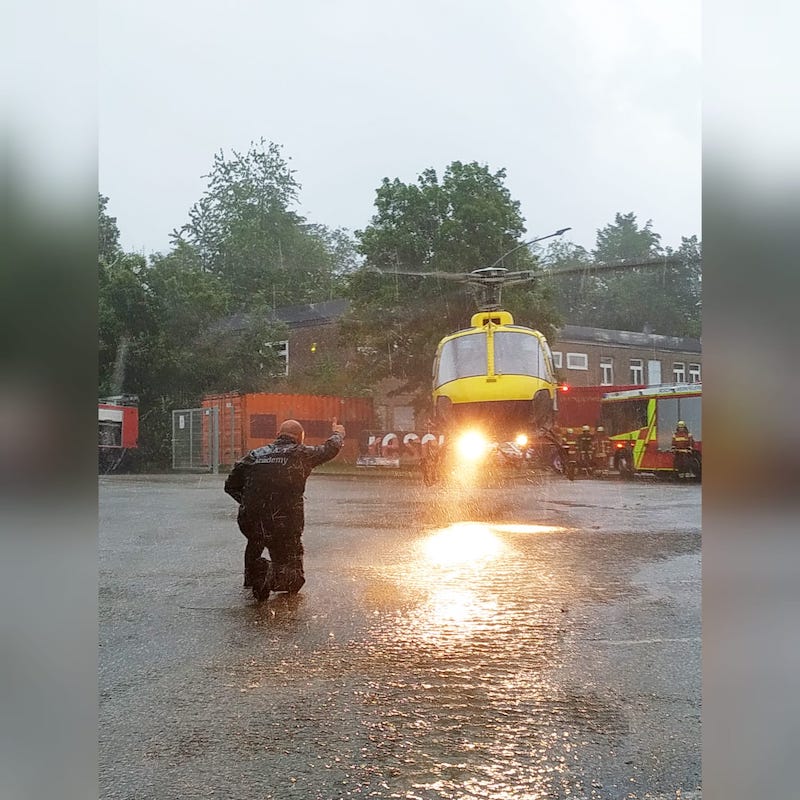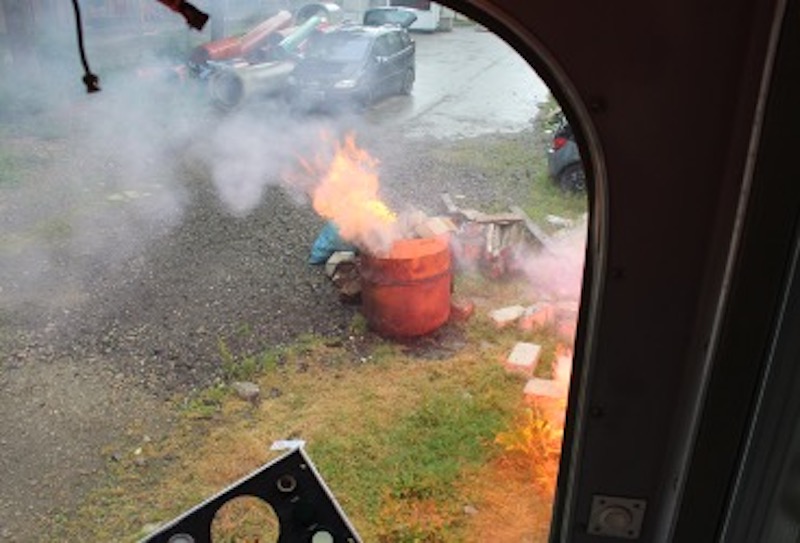Get the weekly SPARTANAT newsletter.
Your bonus: the free E-Book from SPARTANAT.

Wiebke Köhler is a top management consultant, she experiences a kidnapping scenario during a training at the H.E.A.T. Academy in Mosbach, Baden-Württemberg - HERE is the first part and HERE is the second part of the article. HEAT stands for Hostile Environment Awareness Training. The name lives up to its promise. Today, it comes to a good end, the liberation from the "hostage" situation:
The Interrogation
I am pushed into a room and forced to sit on a chair. Now comes my highlight. I just didn't know it in that moment. Then I hear the Colonel from earlier. He surprises me with an opening to the conversation, which a hostage wouldn't expect after such rough and depersonalized treatment: "I apologize for this treatment. These wankers out there are killers. They have no manners at all. I welcome you again, Wiebke. Good to have you here."
Surprising indeed. But does he really expect me to be pleased?
"I have a few questions for you." And so it begins. Name, religious affiliation, profession. Then he surprises me again with the question: "I have seen that your most beloved book is from Carlos Ruiz Zafon, 'The Shadow of the Wind'. Why do you like this book?"
I am perplexed. How does "the Colonel" know this? As far as I know, I have never posted that anywhere in my life. I don't know how he knows that. He can't possibly know! This throws me off for a second. I am still pondering how he could know that, when I realize he is waiting for my response - and one shouldn't keep a hostage-taker in the rank of a Colonel waiting. The book is really great, but in that moment, I can't for the life of me remember the name of the protagonist.
Just imagine: I'm sitting here in a hostage interrogation and the head hostage-taker wants a book review from me. The height of absurdity. Either completely insane or quite clever. I decide for the truth and tell the Colonel that it's been so long since I read the book that I can't remember the name of the protagonist. The interrogation is starting to be fun for me. Then more questions come - he is surprisingly well-informed about me and my career, even about my articles and books about the Bundeswehr.

"It seems that you have some interest in the Special Forces. Why?" What should I say to that? Yes, I admire special forces like the KSK, the GSG9, and others. But I can't possibly make that understandable to a Colonel from an intelligence agency who probably has a completely different view of women. Don't provide any openings for attack! I didn't need to worry about that. Because the Colonel comes to his own conclusion, which then shocks me:
"It is very unusual that a woman is interested in such a topic. You must be a spy!" Oh no. "No, Sir, I am certainly not a spy. I am a teacher who needs to validate an area for building a German school."
"Bullshit," he replies. "As I see it, you have two options. No. 1 - you sign a contract to work for us in our Intelligence Service. Option 2 - we will keep interrogating you. And I may use this for my interrogation." There is a noise, like a drill, right in front of my face.
I only hear this loud screeching, but I don't see what it is. In fact, I don't see anything at all, not even the Colonel, because I still have the sandbag on my head. "I would like to work a little bit on your teeth," says the Colonel with Hollywood-worthy sadism. I can practically see his malicious grin through the sandbag. I know this is still an exercise. But in this situation, knowledge and thinking fall apart. What anyone would instinctively think in such a situation: Now they're going for my teeth!
Quickly I say, "What about option No. 3?" I have to at least try. "There is no option 3," the Colonel says bluntly. Well damn.
"I will give you some time to think about these two options now," says the Colonel. I think to myself, "I don't really need it. It's obvious what I'll do. I'm going to be his secret agent. What choice do I have?!"
The psychologist explained this in detail and with great emphasis yesterday: "In such a situation, it's not about honor and decency, truth or cleverness. It's only about survival. Not about right or wrong. Only about functional or not functional." Finding a job for a foreign intelligence agency seems quite functional to me. Still, it's a good idea to stall for time - with a possible rescue in mind. So I thank him for giving me time to think about his offer.
I am then quickly pulled up from the chair and brought back to the sweaty cats in the corridor.
Standing against the wall, I observe a slightly paradoxical reaction in myself: I really enjoyed that interrogation. At least the Colonel talked to me. His henchmen, except for a brief "Shut up!", had been silent the whole time. Talking is better than that threatening silence. And even though torture was looming, I felt like I could maybe negotiate a tiny bit with the Colonel.
After the scenario ended, during the debriefing, the "Colonel" said with a faint smile: "I have never experienced someone talking so much during such an interrogation, Wiebke." A woman can be proud of that!
My pride diminished slightly afterwards with the added information that soldiers have to endure simulated hostage situations and interrogations for up to 36 hours to be trained for the real possibility of capture. 36 hours? How could anyone handle that? It exceeds my imagination.
Time goes by. But: Time? I have long lost my sense of time. No idea if we've been hostages for one, two, or six hours.
The Liberation
After what feels like an eternity, leaning against the wall, stifling hot under the sandbag, I hear shots outside. Loud shouting. Commands flying through the air. "Let it be the guys from KSK (Kommando Spezialkräfte, the Special Forces of the Bundeswehr)," I pray. The sounds of battle resonate towards us, I stand still and listen to the combat noise.
Then suddenly, very loud and unexpectedly close: "We are German special forces. We are here to rescue you. Everyone on the ground!" This is a shock. I thought a rescue should be a joyful occasion. But no. In fact, our rescuers act just like the hostage-takers stopped. They boss us around, force us to the ground. Afterwards, I recognize this as logical: They don't know yet who is a hostage and who is a terrorist. It could be that some terrorists quickly put on overalls and a sack to escape unnoticed and, above all, alive.
So I throw myself back into the dirt and try not to move frantically. The instructor warned us about this during the briefing. Since the special forces are also filled with adrenaline and do not know exactly who the hostage-takers and the hostages are: "Don't make any frantic movements like cheering or raising your hands in relief! It's best to put your hands back in your neck and lie still."
I feel myself being searched. Again. At least I hear a German voice. Man, that feels good!
Internally, I beg them to quickly take the sack off my head. Then I ask aloud: "Are you from the KSK?" For this, I receive a loud "Shut up!" Oh, I didn't expect that. I found it disturbing. They behave exactly like the kidnappers, and I still have the stupid sandbag on my head.
We are stood up. The special forces give each other some instructions. Then we are lined up one behind the other, with each one putting their hands on the shoulders of the person in front of them. In this rather strange line, we stand still while the special forces get the situation under control. Then finally: "Now you can take off the sacks!" Pure relief.
One of the others in our group wants to speak in relief, but also receives a brusque "Shut up!" Then the leader of the rescuers speaks to us and explains what will happen now. Namely: We walk orderly to the exit, where we will all wait. We will be flown out of here by helicopter. Really? In a real heli? They really bring out heavy equipment for such an exercise! It is agreed: For the "boarding," four hostages will go with one rescuer to the helicopter - on his signal.
Now the steel door opens outside - I take the first look after a long time outside and am moved by the thunder: it's pouring rain, a veritable downpour. Wow, I think, when did the weather change like this? During the attack felt like an eternity ago, the sun was shining, it was blazing hot. Before I can think about it further, I and the other three hostages are up. On the signal of the team leader, one of the rescuers sprints and we four follow him outside. We run towards the helicopter, which lands in front of us on the road. We run, because in case of emergency, no one knows if and how many snipers are lurking behind the next corner aiming. Everyone jumps into the heli. Don't forget to fasten your seatbelt.

I find the lock, but no seatbelt - but honestly, I don't care now. What a great feeling to be free. To see, to breathe freely. No more cable ties on my hands. To see the other participants. The heli takes off with the typical elevator feeling that makes your stomach drop to your knees, and I cry with joy. The hostage-taking may have been simulated, but the feelings are real. The emotions are high for everyone in the group. Though subjectively I never felt in grave danger at any point and objectively I was never in real danger. But this feeling of liberation overwhelms me. All the pent-up stress hormones, the sweat-inducing efforts, the supercharged nerves, the intense feelings of the last few hours - all fall away with an emotional bang. The end of the adrenaline rush. And the end of the exercise.
The End of the Exercise
I smile at my neighbor, Michael. He is also beaming from every pore. Both of us enjoy the unusual and unexpected helicopter flight.
Upon landing, we already see other participants from our group. We embrace and wait for the last ones to be flown out of the heli. After a few minutes, something quite obvious strikes me: we are all standing in the downpour, soaking wet - and no one minds. Rainwater is flowing out of our shoes, washing away all the stress. We look like orange Martians, I think. Orange is the new black.
After a few minutes, the instructor joins us and explains with a benevolent smile: "Exit, end of exercise."
A brief feedback follows. The "captives" now face all the "kidnappers" at the end. Finally, face to face. I am surprised: a large team of 18 men, a small army. It's insane that there are so many, I never would have thought, let alone perceived it during the hostage situation.
We are all incredibly excited and almost jovially walk back to our training area. Everyone is talking over each other. Everyone is sharing their impressions. Some were disturbed by the noises (the foreign macho shouting, the intrusive clicking of the lighter, the intimidating yelling of the guards), others felt intimidated by the growling shepherd dog. Still others found it humiliating to only be addressed by a number.
Afterwards
As we walk back, I assess my own behavior. Apart from the first two minutes of the exercise, I was mentally strong and did not lose my composure. Breathing was difficult under the sack and then standing uncomfortably became a torture. I count that as my lowlights. But neither the noises, nor the sniffing, being touched or interrogated shook me. The interrogation was even my highlight, as well as the car rides - and then the evacuation by helicopter! To speak of "highlights" in a hostage situation - is that exaggerated or already a sign of proper resilience?
Of course, I understand: if this had been a real hostage situation, there would have surely been violence and torture, perhaps even rape. Then maybe gags and headphones would have been added to deprive us of our senses. How long and if we would have survived, I cannot say – and I never want to experience it. This was enough to get a realistic impression and put my own stress resistance through an intensive training. I could imagine leaders who, after such training, never again have nerves before the toughest executive presentation.
I turn to one of the trainers and ask, "How long did the exercise actually last?" "Just under three hours," I hear. What? That was only three hours? It felt much longer to me. The trainer says, "With some groups, we also do it for six hours." I think: No, thanks. I never want to be a hostage again! I'd rather be a commando soldier. In any case, trained and well-prepared for these situations.
After our "release," we are all exhausted. I have never had so much adrenaline in my blood. Even days later, when I am back home, my metabolism is still getting rid of the excess stress hormones - to the point that I sleep less than four hours a night, over three days!

The Debriefing
The next day, we have a professional analysis of the different phases of the attack and captivity. Everything was recorded on video. I see how many people were on the side of the supposed hostage takers. I also see that at every moment there was a paramedic on site, constantly checking if everyone was okay. The psychologist was also there all the time and would have intervened immediately at the first sign of a panic attack from a participant. However, people who tend to have panic attacks are unlikely to attend such training. It would be like confronting the third type of therapy.
So we go through scene by scene. With the psychologist, we classify our stress reactions and behavior together. This is very helpful. Also, the exchange with the others shows that everyone had their own coping strategy, their own emotional reactions, highs and lows. It is only now that I notice: Some of the hostages actually said "EXIT" in the middle of it all. You never know what you are really capable of until you reach your limit. And beyond that. Using "EXIT" is a built-in protection in the exercise to prevent exceeding the personal limit. The personal limit varies for everyone and is not a flaw. It is only intended to be reached, to know that limit, but not to overcome it.
Of course, the helicopter ride was a particularly emotional highlight. Just awesome!
Everyone is profoundly impressed by this unique experience and each takes away many impressions. All participants from our group go sensitized and much more stress-resistant than before to their deployment countries. I wish everyone there does a lot of good, returns safely, and never has to apply their acquired knowledge. And if they do: always breathe through the bag! We also learned this in the container: when nothing else works, gallows humor helps. Also a coping strategy. My "hostage colleagues" said afterwards: "It shocked us more or less - but nice that Wiebke had a great time the whole time!" And everyone laughed. Guys, what did you expect? I come from management. And that is also no walk in the park.
Personal Note
HEAT was so much my thing that I spontaneously decide: in the next life, I will be a commando soldier. And in this life, I will book the next training with the HEAT Academy.
Mario Pröhl, the founder and head of the H.E.A.T. Academy, was in the Bundeswehr for 23 years and was a commando soldier for a long time. With every move, every explanation, he knows what he is doing, what the situation is, and what you need to do to survive and stay composed in even the most critical situations. If I had to evaluate what I experienced and learned from him, he, his course, and his whole team would receive my unconditional 5-star rating with an extra bonus. For years, HEAT has been a must for anyone traveling to critical regions, but also for those who want to be prepared for unforeseen situations here in Germany. And for all business leaders who want to acquire a level of stress resistance that is unparalleled.
H.E.A.T. Academy on the Internet
++ End ++

WIEBKE KÖHLER
has been a top management strategy consultant for over twenty years; she is also a founder, keynote speaker, and multiple book author. During her career, she worked in top management consulting at Roland Berger and McKinsey & Co. As a partner in executive search, she supported international global corporations in filling executive positions and most recently held the position of Chief Human Resources Officer at AXA Group AG in Germany. She is the CEO of the top management consulting firm impactWunder and supports corporations in strategic marketing and HR issues, especially around culture, values and paradigm shifts, and leadership development. She is involved in promoting better networking between the Bundeswehr and civilian society and has so far published numerous articles and two books ("Leading on the Edge" and "Visit to the Troops - People in Uniform").
WIEBKE KÖHLER on the Internet
HEAT TRAINING on SPARTANAT
- RESCUED FROM HOSTAGE (1): Abduction
- RESCUED FROM HOSTAGE (2): Captivity
- RESCUED FROM HOSTAGE (3): Liberation
SPARTANAT is the online magazine for Military News, Tactical Life, Gear & Reviews.
Send us your news: [email protected]
Ad
similar
Get the weekly SPARTANAT newsletter.
Your bonus: the free E-Book from SPARTANAT.


